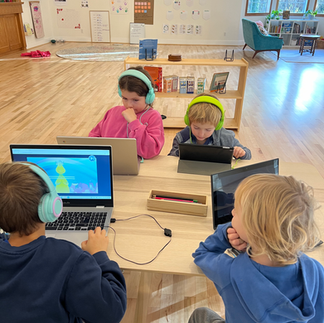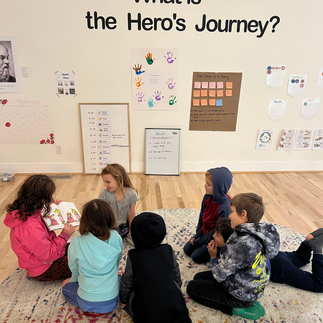Change is in the air as we eagerly welcome a new chapter in our community’s story. This week, the buzz around campus isn't just about the crisp fall weather or the excitement of new projects — it's about new beginnings. A new learner has joined our ranks, a new guide is here to nurture curiosity and growth, and, of course, the Millstone River is once again calling us to embark on fresh adventures!
Recent heavy rains transformed the landscape of our riverfront. Meandering paths were filled in with running water, tree trunks we'd crawled over and explored just one week ago were washed away, and opportunities for new fresh games emerged! Our group jumped at the chance to build dams, collect "gems", and set up a Rock Shop to sell their wares. Whereas before, wading in the river had been the main activity of choice, the rushing waters kept us on dry land and the group naturally began to explore the bordering forest. Leaves were cleared and houses made, and many hours were spent in new-found nooks and crannies amongst the trees.
Our group continues to work hard through their core skills work - mastering reading, writing, and math at their own pace. Even our youngest learners (aged 5 years old) are setting daily SMART goals for what they will achieve that day (ie: 5 pages in their math book, 3 levels in their e-learning program, 3 BOB books, etc.) and reflecting once Core Skills time is over to see how they did. With repetition and consistency, this practice will become a lifelong habit - one that is shared by many of the most intentional and successful people the world over. SMART goals are one of the many ingenious elements of the Acton model. Academic learning happens, and it happens at an incredible rate, but the biggest learning in any Acton is the life skills that will help each of these heroes lead a passionate, purposeful life and achieve their greatest dreams. With emphasis being placed on things like goal setting, peer-to-peer and individual accountability, communication strategies, conflict resolution, leadership, self-directed learning, and perhaps most importantly, finding one's unique gifts and talents, these children will be well equipped to thrive in an ever-changing world, and manifest an inspired life.
This week we read a wonderful book called "The Girl Who Never Made Mistakes". In it, author Mark Pett tells the story of Beatrice Bottomwell, a young girl who prides herself on never making mistakes — until one day, she makes a big one. The book explores the pressures of perfectionism and the beauty of embracing our imperfections. After reading the story together, our group discussion delved into how society often values flawless performance, leading to fear and stress. We reflected on how Beatrice’s journey reminded us that making mistakes is not only natural but essential for growth. As we shared our own experiences, we recognized that mistakes open the door to learning, creativity, and resilience. The conversation highlighted the importance of embracing mistakes as part of the learning process, helping us shift from a mindset of fear to one of curiosity and self-compassion. Ultimately, we agreed that being imperfect is what makes us human — and it’s through our mistakes that we find opportunities to improve and discover new strengths. This conversation inspired one of our older learners, who just 2 months ago was resistant to reading aloud with her own family, to read a story aloud to her peer group for morning circle. She had a captivated and enthusiastic audience, and despite making a mistake here and there, she beamed with pride when she was done.
As we continue to grow, with new bodies come new minds and creative ideas! It's been fascinating to see the games evolve during "Spark Play"; our term for the hours spent in the afternoon in completely unstructured, free play. This week we saw the group build a Medic-shelter in the Anji area, complete with a moat and a bridge. Great battles were fought on the field and wounded soldiers were rescued and brought to the shelter for much needed aid. On particularly wet days, the group constructed forts and dragon's dens using the studio Kiddie Couch and other furniture. Each day, come 1:30 in the afternoon it looks like a tornado has swept through the studio! Magnatiles in various states of construction, wool balls scattered from one end of the room to the other, cushions propped up to create forts, colouring pages, books, and pencils strewn across tables. Fast forward 30 minutes and the studio is in spotless condition - tidied, swept, and organized entirely by the learners.
It's an unfortunate truth that, over time, the value of play for school-aged children has been downplayed. Thankfully, due to research being conducted by various psychologists, this perception is changing. One giant in this field, a developmental psychologist named Dr. Peter Gray, argues that play is not just a fun activity for children, but a crucial part of their cognitive, emotional, and social development. He explains that play allows children to explore and engage with the world around them in ways that structured learning or adult-directed activities cannot. Through play, children practice problem-solving, experiment with new ideas, and build the resilience to cope with challenges — all in a safe and natural context. Gray also emphasizes that play fosters creativity and imagination, as children invent games, take on different roles, and create narratives that help them better understand themselves and others. Socially, play provides an environment where children learn to cooperate, negotiate, and resolve conflicts, skills that are essential for healthy relationships throughout life. In essence, Gray believes that play is not merely a form of entertainment but a vital process through which children learn how to navigate the complexities of the world and develop the essential skills they will carry with them into adulthood.
It's just one more of the many things I love about the Acton model. Our acknowledgment of the importance of play is not merely lip-service. It is an essential part of our Spark studio day, as evidenced by the hours we set aside each afternoon for it.
I will leave you with one of my favourite quotes from Dr. Gray's book, "Free to Learn"...
“Play is the most important thing that children can do. It is the way they learn how to think, solve problems, and develop social and emotional skills."
I hope you have a wonderful, relaxing, playful weekend :)






























Comments